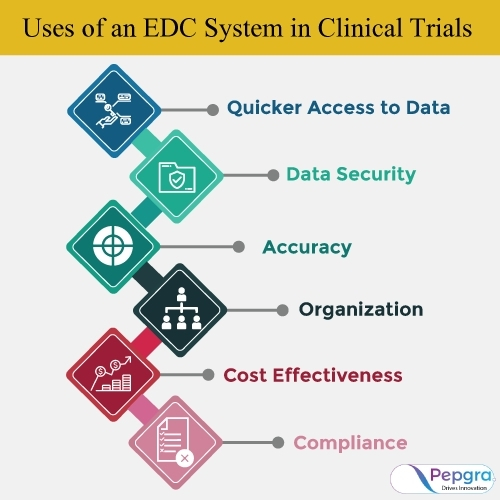In-Brief:
- Clinical Trial Management Systems (CTMS) are an essential part of every clinical trial. Choosing the right CTMS helps address inadequacies on the operational side of research, such as clinical trial preparation, planning, performance and writing for clinical trial monitoring.
- As more pharma and biopharma promoters start to identify the potential breaks with EDC-CTMS integration, there is a growing requirement to address the complicated electronic data capture (EDC) execution procedure.
- Pepgra explains the EDC benefits and implementation process in this blog and also offers clinical trial monitoring services
Introduction:
An Electronic Data Capture (EDC) framework is programming that stores persistent information gathered in clinical trials to lay it out plainly. Information is ordinarily first recorded on paper and is then translated into the framework and saved in an electronic case report format (CRF). An ever-increasing number of clinical trials are taking EDC programming and supplanting paper records with electronic records. Supporters, contract research organization (CROs), and locales have embraced EDC frameworks to do both straightforward and complex trials taking all things together periods of research. While there are numerous EDC merchants, a few associations assemble their framework in-house using clinical trial services. Most EDC frameworks offer somewhat various highlights, yet all EDC programming is intended to smooth out information assortment.
Uses of an EDC system in clinical trials
Many research associations understand EDC’s upsides over different techniques and utilize new medical monitor responsibilities in a clinical trial. An EDC framework can assist you with making progress in the accompanying manners:
Quicker Access to Data
An EDC framework can save a lot of time with continuous admittance to information and less time spent on inquiry the board. It additionally saves time toward the finish of an investigation, permitting faster accessibility of the data for examination. While it can require some investment to at first figure out how to utilize a particular framework, some are spontaneous to such an extent that a couple of long periods of preparing is required for clinical research monitoring.

Data Security
An EDC framework is facilitated online with an information section finished on an electronic interface in the clinical trial audit. Given the idea of the information gathered in an EDC framework, programming sellers ensure the information is secured and sponsored up. Since every client account has assigned consents, most activities must be completed by specific jobs.
Accuracy
EDC frameworks improve information quality. There are choices to include limitations in a format that keep erroneous or strange rates from being entered. Utilizing a modernized framework empowers decipherable passages and programmed counts for cleaner information using clinical trial monitoring services.
Organization
The utilization of an EDC framework expands clinical trial management proficiency because of its easy to understand the route. Search choices permit you to discover and channel precisely what you need handily and store everything in one area with more prominent while utilizing less paper.
Cost-Effectiveness
Monetarily talking, the expense of an EDC framework goes from free to costly. Valuing shifts, and a few sellers charge for extra help and different costs. Buying an EDC framework can appear to be a huge venture. However, it should set aside cash over the long haul.
Compliance
An EDC should be consistent with administrative prerequisites. The product ought to have technical controls set up to guarantee information honesty. To appropriately keep an EDC framework, standard operation procedure (SOPs) are fundamental to ensuring administrative and hierarchical approaches are met.
Performing EDC in clinical trials
Making the transition to EDC
The appearance of EDC advancements is molding the clinical preliminaries information the executive’s scene, offering numerous advantages for the business. EDC’s appropriation instead of paper-based strategies was initially passive; anyway, clients can get things done with EDC that they can’t do with standard information bases, making a solid case for the venture. The most recent years have seen an extraordinary move in EDC’s take-up with paper CRFs currently just being considered for specific prerequisites. Advanced layouts are handily changed to suit each new investigation; saving time spent planning and delivering paper CRFs. On average, it has been demonstrated that EDC cuts 41% of pre-study planning time. Utilizing EDC, information is gathered and gone into an information assortment device just a single time, with a paper framework; information should be entered first and foremost into a case report structure then into an electronic framework by an information section gathering. It expands handling time as well as influences record honesty.
EDC likewise permits information cleaning to happen promptly and doesn’t need escalated hands-on work from information the executive’s bunch for preparing. The info the executive’s bunch executes the rationale checks against data gathered weeks or months back as paper contemplates. EDC framework rationale checks are conducted when the site enters and submits information, permitting it to be cleaned progressively. At last, following appropriate framework determination and advancement, just as excellent examination the executives, EDC allows clients brisk admittance to clean information with low operational expenses.
Making a complete EDC data set plan
There is a requirement for interest as expected and assets to guarantee that every preliminary information base is exhaustive. If organizations don’t make this venture, there is a danger that changes, or increments, will be required later, which will be exorbitant and could have more extensive ramifications on tasks.
Most EDC frameworks accompany a standard set-up of reports; nonetheless, extra pieces might be needed for study oversight and the board. Most great EDC merchants can give additional custom announcing. Likewise, with the information base turn of events, the plan of reports must be very much thought of and indicated toward the start of the investigation.
Inside the plan of an EDC framework, it is likewise imperative to consider the configuration in which information is being gathered to be genuinely deciphered or customized in another outsider programming once it leaves the EDC framework. Executing a predictable information assortment strategy incorporates normalizing the definitions for the information gathered across numerous destinations.
EDC frameworks should have a choice to observe Clinical Data Interchange Standards Consortium (CDISC) principles, and for datasets to be following Clinical Data Acquisition Standards Harmonization (CDASH) rules, so it is prepared for factual examination later on. It can save time and efficiencies as non-CDASH information should be re-attempted to satisfy a CDISC guideline upon administrative accommodation.
The utilization of a more prominent number of standard plans during study constructs can assist with proficiency and the nature of revealing. Yet, it altogether lessens the time it takes for information bases to be assembled.
Conclusion:
As more pharma and biopharma promoters start to identify the potential breaks with EDC-CTMS integration, there is a growing requirement to address the complex electronic data capture (EDC) execution procedure and its applications. Pepgra explains the EDC benefits and implementation process in this blog and also offers clinical monitoring services.
References:
- Sahoo, U., & Bhatt, A. (2004). Electronic data capture (EDC)–a new mantra for clinical trials. Quality Assurance, 10(3-4), 117-121.
- El Emam, K., Jonker, E., Sampson, M., Krleža-Jerić, K., & Neisa, A. (2009). The use of electronic data capture tools in clinical trials: Web-survey of 259 Canadian trials. Journal of medical Internet research, 11(1), e8.






